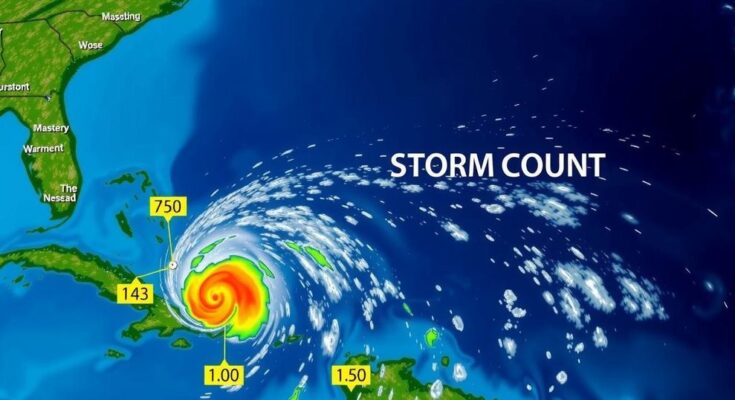The 2024 Atlantic hurricane season concluded with 11 hurricanes, notably above the average of seven, causing extensive destruction across the Gulf Coast and beyond. Hurricane Beryl set records for June hurricanes while Hurricane Helene marked the deadliest storm since Katrina, highlighting the increasing severity and unpredictability of these weather events exacerbated by climate change.
The 2024 Atlantic hurricane season concluded on Saturday, witnessing an exceptional 11 hurricanes—substantially surpassing the average of seven storms. This season was notably unprecedented, characterized by exceptionally warm ocean temperatures. Eight hurricanes made landfall across various regions, including the United States, Bermuda, Cuba, the Dominican Republic, and Grenada, leaving a path of destruction and significant impacts far removed from their coastal origins.
A particularly remarkable event occurred with the formation of Hurricane Beryl, recognized as the first Category 4 hurricane ever recorded in June. It struck Carriacou in Grenada, wreaking havoc on crops and infrastructure, resulting in two fatalities. Its unprecedented strength was noted, as the last Category 4 hurricane to impact Jamaica was Dean in 2007. Beryl further escalated to become the earliest Category 5 hurricane in the Atlantic by July 1, challenging existing seasonal norms since major hurricanes typically do not emerge until after September 1.
In September, Hurricane Helene emerged as the deadliest storm to impact the U.S. mainland since Hurricane Katrina in 2005, accounting for over 200 lives lost and causing catastrophic damage across the southeastern United States. North Carolina alone projected damages at a staggering $48.8 billion, with widespread destruction affecting homes, essential water systems, agricultural lands, and forested areas across multiple states, including Florida, Georgia, South Carolina, Tennessee, and Virginia.
October brought Hurricane Milton, which intensified rapidly with wind speeds soaring to 180 mph, marking it as one of the most powerful hurricanes recorded in the Gulf of Mexico, with only Hurricane Rita appearing stronger in this context. Following Helene and Milton, regions affected experienced rainfall totals three times higher than their historical averages for September and October, marking record wetness in cities such as Asheville, Tampa, and Orlando.
In November, Hurricane Rafael emerged, reaching wind speeds of 120 mph and nearly tying records for November storms in the Gulf of Mexico. As Rafael impacted Cuba, the island faced further tribulations, recovering from the widespread power outages caused by Hurricane Oscar in October. Several scientists attribute the extreme hurricane activity to climate change, highlighting the role of greenhouse gases like carbon dioxide and methane, which are contributing to significant ocean warming, thereby increasing the likelihood of unusual and intense storm behavior.
The Atlantic hurricane season typically spans from June to November, with the current season marking an unusually active period characterized by an increased number of hurricanes and associated impacts. Meteorological research suggests that warm ocean temperatures significantly contribute to the formation and intensification of hurricanes. The storms this season underscored the vulnerability of coastal communities to extreme weather events, especially in light of evolving climate conditions that favor such occurrences. The unexpected timing and strength of several storms also indicate a shift in seasonal patterns which had been previously well-established.
In summary, the 2024 Atlantic hurricane season was notably unprecedented, featuring an excess of hurricanes that caused widespread destruction across numerous regions. Significant storms like Hurricane Beryl exhibited characteristics that defy historical norms, indicating alterations in annual hurricane patterns influenced by climate change. The extensive damages reported, particularly from Hurricane Helene, underscore the urgent need for continuous monitoring and preparedness strategies to mitigate future impacts of extreme weather events on vulnerable communities.
Original Source: www.arkansasonline.com




